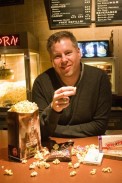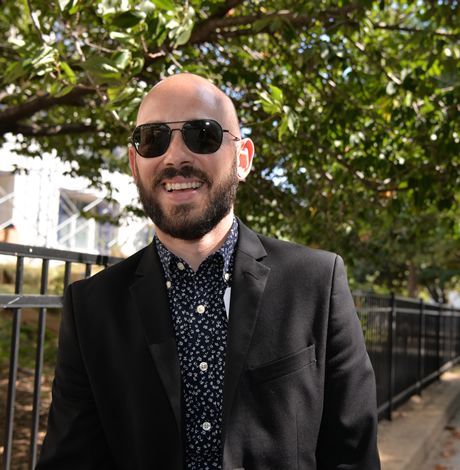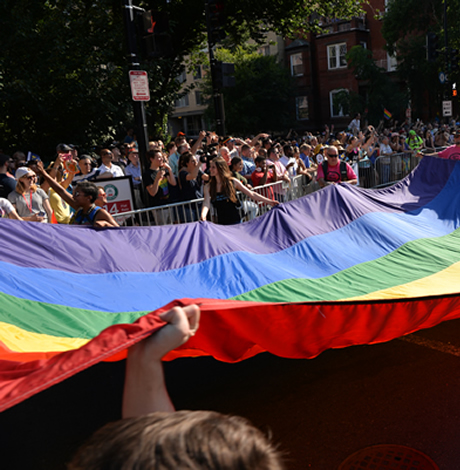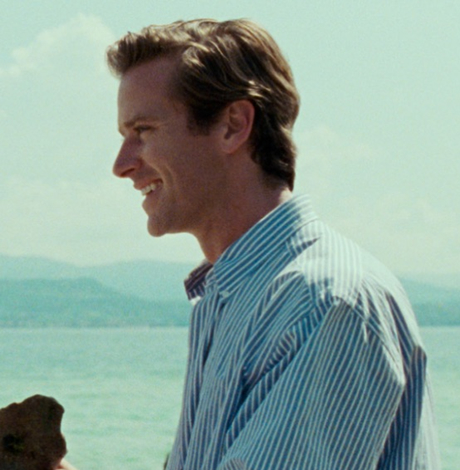Arts & Entertainment
Film, food and fun
D.C. Shorts kicks off ninth annual festival Thursday
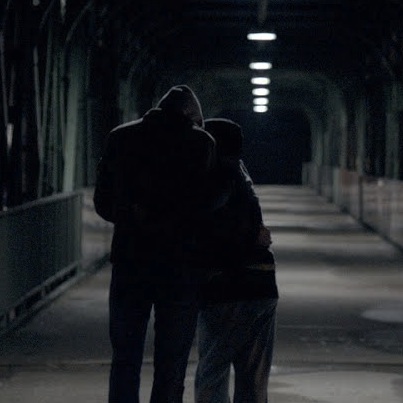
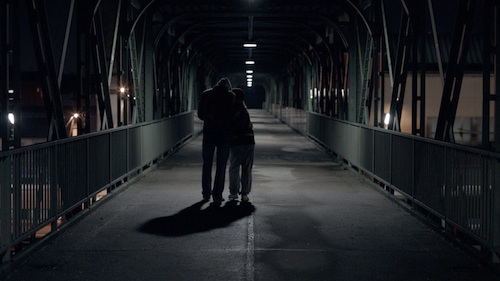
A scene from ‘Hatch,’ a 19-minute LGBT-themed drama directed by Christoph Kuschnig from Austria about two couples forced to make hard decisions on a wintry night. It’s part of ‘Showcase 10,’ a series of films that will be shown on Sept. 8 and 10 at E Street Cinema as part of the D.C. Shorts Film Festival. (Photo courtesy D.C. Shorts)
The D.C. Shorts Film Festival
September 6-16
Various venues
Ticket prices start at $12 and include an online only option
The numbers behind the ninth annual D.C. Shorts Film Festival are staggering: 140 films under 20 minutes long, 27 countries, four venues, eight chefs, 16 showcases, 11 days, five parties and six screenplays staged by local actors. Luckily, Jon Gann and his talented colleagues have it under control and their excellent website guides audience members easily through the festival.
Gann, the openly gay founder and director of the Festival, became interested in filmmaking when he became disenchanted with his work in media relations.
“I owned a graphic design firm for many, many years and I was tired of producing stuff that I thought was great that clients thought was schlock and stuff I thought was schlock that they thought was great, so I decided to go to film school,” he says.
His most notable film to date is the award-winning “Cyberslut,” a nine-minute confession of an unnamed man obsessed with finding sex on the Internet. In intimate and riveting detail, the film tracks his fascination of the online hunt, the frequent disappointment at the first meeting and the occasional ecstatic encounter that sends him back to the computer to hunt again. As the narrator wryly notes, “a computer lets you make more mistakes faster than any other invention in human history, with the possible exception of handguns and tequila.”
Gann’s experience with film festivals (“Cyberslut” has had 47 screenings worldwide, making it one of the most successful gay-themed short films) inspired him to create a different kind of film festival.
“I travelled to festivals all over the world and that’s when I realized that many festivals were about food and parties and sponsors but not necessarily about films or filmmakers,” Gann says. “That’s when I said I need to do something that’s different. The focus of my festival was going to be on filmmakers and if I did that right, then the food and the money and the parties would come.”
Gann has established a system to make the Festival a supportive environment for filmmakers.
“We give feedback to all the filmmakers who enter, whether they make it into the festival or not. We allow them to see their scores and the judges’ comments. That has helped some filmmakers recraft their final edit to make it tighter.”
Gann also realized he wanted to focus on short films (less than 20 minutes). He thinks that “there’s a hunger for really good short content. If Internet use is any indication, people like to see a story in a few minutes.” He adds that short films are also a great way for fledgling artists to learn their craft.
“As a filmmaker,” he says, “if you’re able to tell a succinct story that grabs the audience’s attention and is emotionally gripping in a few minutes, then you know what you’re doing as a storyteller. And that to me is impressive.”
So, in 2004, Gann started the D.C. Shorts Festival, financed largely with money from his own checking account. The first year, 75 films were submitted and 32 films were presented in three screenings for enthusiastic audiences. Looking back on the experience, he says, “It made me a nervous wreck but the whole thing was a big success. We sold out all the tickets and had to turn people away, which was amazing. And it’s grown from there.”
Today, D.C. Shorts is the largest short film festival on the East Coast.
There were more than 850 submissions for the 2012 Festival. After a rigorous selection process, 140 movies were chosen for screening. The films, with run times ranging from one to 20 minutes, are being presented in 16 showcases. Each showcase lasts around 90 minutes. An interactive online tool called “The Film Finder” helps audience members select the programs they’re most interested in seeing. Browsers can sort by showcase, country of origin, genre (documentary, animation, horror, comedy, drama and so on) and interest area (including LGBT, local films and celebrities).
The showcases will be presented at four venues throughout the D.C. region, including the E Street Cinema, the U.S. Navy Memorial, the Atlas Performing Arts Center and the new Angelika Film Center in Fairfax.
In addition to the showcases, there are a variety of other events for filmmakers and film fans to enjoy. For example, patrons can enjoy:
• Free lunch time screenings at the E Street Cinema in downtown D.C.
• Free family and teen screenings at the new Angelika Film Center in Virginia
• A screenplay competition where six scripts (selected from 185 submissions) are given a staged reading by local actors and directors. The winner will receive a cash prize ($1,000 when the award is made and $1,000 when the film is completed) and a slot in the 2013 Festival.
• Free seminars for aspiring and practicing filmmakers
• “The Best of DC Shorts” showcase which features movies selected by audiences during the festival’s opening weekend
• An Awards Brunch with accolades from the festival jury, the festival director, audience members, and a peer award from the filmmakers themselves
• And, a variety of legendary parties that offer “food and drink and DJs and dancing and lots of chances to meet filmmakers.”
Gann adds that that this year’s festival has an emphasis on films about food and includes partnerships with area restaurants.
“We have a big food-film program this year,” he says. “We’ve paired eight films with local chefs who’ve prepared special dishes based on those films. At those films, you can actually sample the food at the end of the screening.”
For example, “Murder Mouth” by first-time Australian filmmaker Madeleine Parry is a documentary showing how, “Madeleine decides that unless she kills it, she can’t eat it.” The film is paired with Ed Witt’s recipe for Crostini with Lamb Tartare, which will be served to audience members after select screenings. Like Maddie in the film, the chef from 701 argues that, “Modern day carnivores have become so disconnected from their food that they are unable to identify it without the labels from the grocery store.”
Queer themes
Several selections in this year’s Festival have LGBT storylinesThe D.C. Shorts Film Festival includes 10 films with explicitly LGBT content. They are sprinkled throughout the showcases, often in interesting combinations with other films.
The most delightful, a modern day fairy tale called “The Maiden and the Princess,” is actually part of the free Family Showcase on Sept. 15 at the Angelika Film Center. Directed by American filmmaker Ali Scher, this charming film tells the story of Emmy, who is teased by her classmates and rebuked by her parents when she kisses another girl.
Luckily Hammond, a narrator with the Grand High Council of Fairy Tale Rules and Standards intervenes. He transports himself (in fairy godmother drag) and Emmy into a musical fairy tale that reassures Emmy that her feelings are perfectly normal and that convinces Hammond’s stodgy superior to let him put the “fairy” back in fairy tale.
Scher was very clear about her aim in making the film, saying “My goal with this project is to cut through the silence and facilitate honest communication between children and parents about sexual orientation.” She affirms that she made the movie so that “no kid ever has to feel ashamed of who they are. We as a society need to encourage individuality in children, even if it means exposing them to things we are afraid of.”
A much darker story is told in “Hatch” by Austrian director Christopher Kuschnig, who won a student Oscar for the film. “Hatch” tells the stories of two couples whose lives intersect on a wintry night in Vienna and the baby whose fate will be changed by the decisions they make. Kuschnig succeeds in using an innovative narrative and visual style to capture both the inner dynamics of each couple and the broader social implications of their desperate acts.
“‘Hatch’ is much more than the story of one couple’s wrenching decision and another’s criminal act,” he says. “I was particularly interested in each couple’s distinct dynamics and how these events on this particular night could challenge their assumptions of each other, and therefore alter their relationships and eventually their lives.”
Some of the other LGBT films in the Festival are “The Queen of My Dreams,” a Bollywood influenced take on a young lesbian’s coming-out story; “Cobra,” which takes a grieving father from the funeral of his estranged son to the bar where his son performed; and “The Gay Who Wasn’t Gay Enough,” a hard-hitting take on conformity in the gay community. — BRIAN T. CARNEY

Friday, January 9
Women in Their Twenties and Thirties will be at 8 p.m. on Zoom. This is a social discussion group for queer women in the Washington, D.C. area. For more details, visit Facebook.
“Backbone Comedy” will be at 8 p.m. at As You Are. Backbone Comedy is a queer-run fundraiser comedy show at As You Are Bar DC, where comics stand up for a cause. Each show, a percentage of proceeds go to a local organization – Free Minds DC, a reentry organization for individuals impacted by incarceration. Tickets cost $19.98 and are available on Eventbrite.
Saturday, January 10
Go Gay DC will host “LGBTQ+ Community Brunch” at 11 a.m. at Freddie’s Beach Bar & Restaurant. This fun weekly event brings the DMV area LGBTQ+ community, including allies, together for delicious food and conversation. Attendance is free and more details are available on Eventbrite.
Monday, January 12
“Center Aging: Monday Coffee Klatch” will be at 10 a.m. on Zoom. This is a social hour for older LGBTQ+ adults. Guests are encouraged to bring a beverage of choice. For more information, contact Adam ([email protected]).
Genderqueer DC will be at 7 p.m. on Zoom. This is a support group for people who identify outside of the gender binary, whether you’re bigender, agender, genderfluid, or just know that you’re not 100% cis. For more details, visit genderqueerdc.org or Facebook.
Tuesday, January 13
Coming Out Discussion Group will be at 7 p.m. on Zoom. This is a safe space to share experiences about coming out and discuss topics as it relates to doing so — by sharing struggles and victories the group allows those newly coming out and who have been out for a while to learn from others. For more details, visit the group’s Facebook.
Trans Discussion Group will be at 7 p.m. on Zoom. This group is intended to provide an emotionally and physically safe space for trans people and those who may be questioning their gender identity/expression to join together in community and learn from one another. For more details, email [email protected].
Wednesday, January 14
Job Club will be at 6 p.m. on Zoom upon request. This is a weekly job support program to help job entrants and seekers, including the long-term unemployed, improve self-confidence, motivation, resilience and productivity for effective job searches and networking — allowing participants to move away from being merely “applicants” toward being “candidates.” For more information, email [email protected] or visit thedccenter.org/careers.
The DC Center for the LGBT Community will partner with House of Ruth to host “Art & Conversation” at 3 p.m. at 1827 Wiltberger St., N.W. This free workshop will involve two hours of art making, conversation, and community. Guests will explore elements of healthy relationships with a community-centered art activity. This workshop involves paint, so please dress accordingly. All materials will be provided. For more details, email [email protected].
Thursday, January 15
The DC Center’s Fresh Produce Program will be held all day at the DC Center for the LGBT Community. People will be informed on Wednesday at 5 p.m. if they are picked to receive a produce box. No proof of residency or income is required. For more information, email [email protected] or call 202-682-2245.
Virtual Yoga Class will be at 7 p.m. on Zoom. This free weekly class is a combination of yoga, breathwork and meditation that allows LGBTQ+ community members to continue their healing journey with somatic and mindfulness practices. For more details, visit the DC Center’s website.
Movies
‘Hedda’ brings queer visibility to Golden Globes
Tessa Thompson up for Best Actress for new take on Ibsen classic

The 83rd annual Golden Globes awards are set for Sunday (CBS, 8 p.m. EST). One of the many bright spots this awards season is “Hedda,” a unique LGBTQ version of the classic Henrik Ibsen story, “Hedda Gabler,” starring powerhouses Nina Hoss, Tessa Thompson and Imogen Poots. A modern reinterpretation of a timeless story, the film and its cast have already received several nominations this awards season, including a Globes nod for Best Actress for Thompson.
Writer/director Nia DaCosta was fascinated by Ibsen’s play and the enigmatic character of the deeply complex Hedda, who in the original, is stuck in a marriage she doesn’t want, and still is drawn to her former lover, Eilert.
But in DaCosta’s adaptation, there’s a fundamental difference: Eilert is being played by Hoss, and is now named Eileen.
“That name change adds this element of queerness to the story as well,” said DaCosta at a recent Golden Globes press event. “And although some people read the original play as Hedda being queer, which I find interesting, which I didn’t necessarily…it was a side effect in my movie that everyone was queer once I changed Eilert to a woman.”
She added: “But it still, for me, stayed true to the original because I was staying true to all the themes and the feelings and the sort of muckiness that I love so much about the original work.”
Thompson, who is bisexual, enjoyed playing this new version of Hedda, noting that the queer love storyline gave the film “a whole lot of knockoff effects.”
“But I think more than that, I think fundamentally something that it does is give Hedda a real foil. Another woman who’s in the world who’s making very different choices. And I think this is a film that wants to explore that piece more than Ibsen’s.”
DaCosta making it a queer story “made that kind of jump off the page and get under my skin in a way that felt really immediate,” Thompson acknowledged.
“It wants to explore sort of pathways to personhood and gaining sort of agency over one’s life. In the original piece, you have Hedda saying, ‘for once, I want to be in control of a man’s destiny,’” said Thompson.
“And I think in our piece, you see a woman struggling with trying to be in control of her own. And I thought that sort of mind, what is in the original material, but made it just, for me, make sense as a modern woman now.”
It is because of Hedda’s jealousy and envy of Eileen and her new girlfriend (Poots) that we see the character make impulsive moves.
“I think to a modern sensibility, the idea of a woman being quite jealous of another woman and acting out on that is really something that there’s not a lot of patience or grace for that in the world that we live in now,” said Thompson.
“Which I appreciate. But I do think there is something really generative. What I discovered with playing Hedda is, if it’s not left unchecked, there’s something very generative about feelings like envy and jealousy, because they point us in the direction of self. They help us understand the kind of lives that we want to live.”
Hoss actually played Hedda on stage in Berlin for several years previously.
“When I read the script, I was so surprised and mesmerized by what this decision did that there’s an Eileen instead of an Ejlert Lovborg,” said Hoss. “I was so drawn to this woman immediately.”
The deep love that is still there between Hedda and Eileen was immediately evident, as soon as the characters meet onscreen.
“If she is able to have this emotion with Eileen’s eyes, I think she isn’t yet because she doesn’t want to be vulnerable,” said Hoss. “So she doesn’t allow herself to feel that because then she could get hurt. And that’s something Eileen never got through to. So that’s the deep sadness within Eileen that she couldn’t make her feel the love, but at least these two when they meet, you feel like, ‘Oh my God, it’s not yet done with those two.’’’
Onscreen and offscreen, Thompson and Hoss loved working with each other.
“She did such great, strong choices…I looked at her transforming, which was somewhat mesmerizing, and she was really dangerous,” Hoss enthused. “It’s like when she was Hedda, I was a little bit like, but on the other hand, of course, fascinated. And that’s the thing that these humans have that are slightly dangerous. They’re also very fascinating.”
Hoss said that’s what drew Eileen to Hedda.
“I think both women want to change each other, but actually how they are is what attracts them to each other. And they’re very complimentary in that sense. So they would make up a great couple, I would believe. But the way they are right now, they’re just not good for each other. So in a way, that’s what we were talking about. I think we thought, ‘well, the background story must have been something like a chaotic, wonderful, just exploring for the first time, being in love, being out of society, doing something slightly dangerous, hidden, and then not so hidden because they would enter the Bohemian world where it was kind of okay to be queer and to celebrate yourself and to explore it.’”
But up to a certain point, because Eileen started working and was really after, ‘This is what I want to do. I want to publish, I want to become someone in the academic world,’” noted Hoss.
Poots has had her hands full playing Eileen’s love interest as she also starred in the complicated drama, “The Chronology of Water” (based on the memoir by Lydia Yuknavitch and directed by queer actress Kristen Stewart).
“Because the character in ‘Hedda’ is the only person in that triptych of women who’s acting on her impulses, despite the fact she’s incredibly, seemingly fragile, she’s the only one who has the ability to move through cowardice,” Poots acknowledged. “And that’s an interesting thing.”
Arts & Entertainment
2026 Most Eligible LGBTQ Singles nominations
We are looking for the most eligible LGBTQ singles in the Washington, D.C. region.

Are you or a friend looking to find a little love in 2026? We are looking for the most eligible LGBTQ singles in the Washington, D.C. region. Nominate you or your friends until January 23rd using the form below or by clicking HERE.
Our most eligible singles will be announced online in February. View our 2025 singles HERE.
-

 National3 days ago
National3 days agoWhat to watch for in 2026: midterms, Supreme Court, and more
-

 District of Columbia4 days ago
District of Columbia4 days agoTwo pioneering gay journalists to speak at Thursday event
-

 Colombia4 days ago
Colombia4 days agoBlade travels to Colombia after U.S. forces seize Maduro in Venezuela
-

 a&e features4 days ago
a&e features4 days agoQueer highlights of the 2026 Critics Choice Awards: Aunt Gladys, that ‘Heated Rivalry’ shoutout and more

